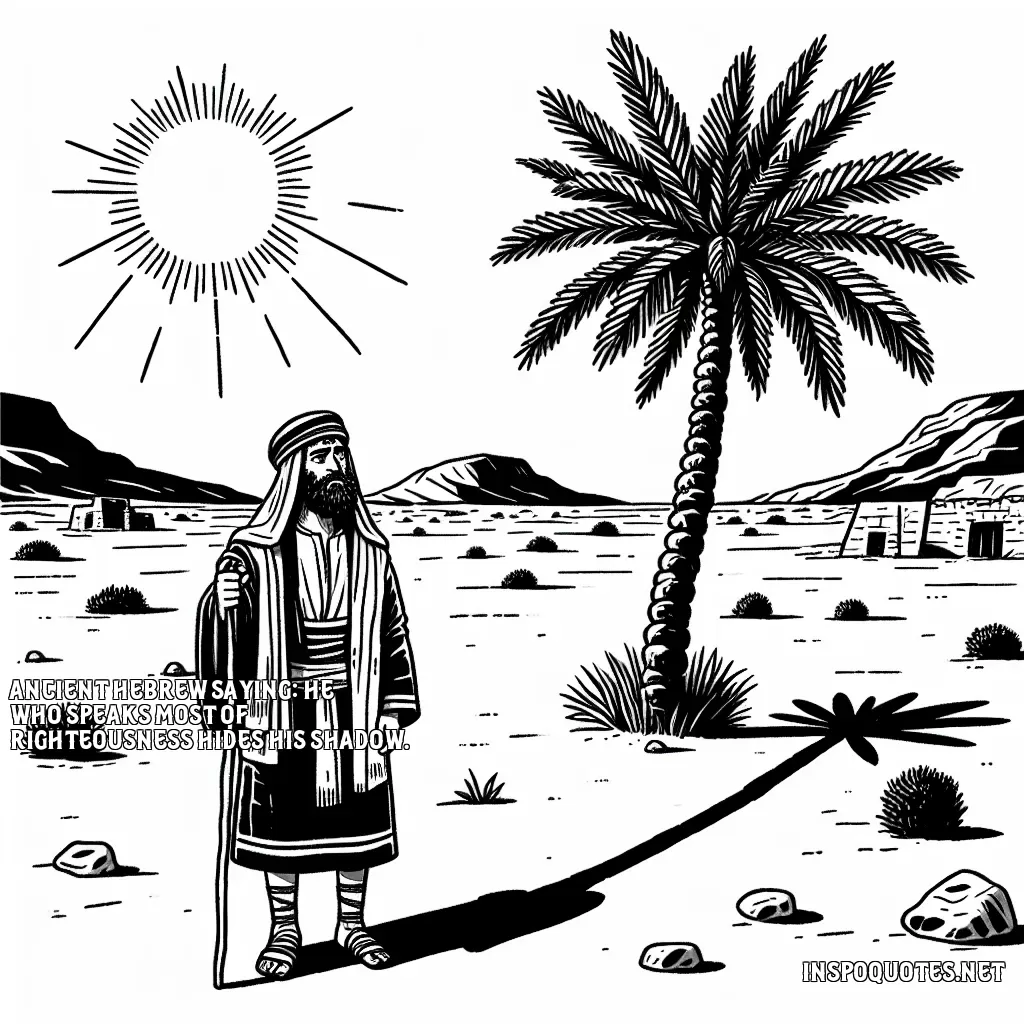
Ancient Hebrew Saying: He who speaks most of righteousness hides his shadow.
Author: Talmud
👁️ 8 views

Ancient Hebrew Saying: He who speaks most of righteousness hides his shadow.
👁️ 8 views
The ancient Hebrew saying, "He who speaks most of righteousness hides his shadow," offers a profound insight into human behavior and the complexities of moral posturing. At its core, this saying suggests that those who loudly proclaim their righteousness or moral purity might be concealing their own flaws, shortcomings, or morally questionable actions. To understand this concept, it's essential to consider the metaphor of the "shadow." In psychological terms, particularly in Jungian psychology, the shadow represents the unconscious part of the personality that contains repressed weaknesses, desires, and instincts. It's the darker side of an individual, which one might not fully acknowledge or accept. Therefore, when someone focuses intently on speaking about righteousness, it may be a way of diverting attention from, or compensating for, the aspects of themselves that they are ashamed of or wish to ignore. This saying implies that excessive vocalization of righteousness could be an act of defense or overcompensation. By consistently projecting an image of moral superiority, such individuals attempt to shield their imperfections from the scrutiny of others and sometimes from themselves. It serves as a reminder to be wary of those who constantly assert their moral high ground, as their need to do so may stem from an internal moral conflict. Furthermore, this saying encourages introspection and humility. It invites everyone to recognize and accept their own shadows, implying that true righteousness involves self-awareness and authenticity. Authenticity requires acknowledging one's imperfections and striving for betterment without the need for ostentation. In essence, the saying teaches that genuine virtue doesn't require loud declarations; rather, it is naturally evident in one's actions and character.
Quote By: Talmud
**Biography of the Talmud**
The Talmud, a central text in Rabbinic Judaism, is a compilation of ancient Jewish teachings, laws, and discussions that shape Jewish thought and practice to this day. The word "Talmud" means "study" or "learning" in Hebrew, reflecting its role as a foundational source for Jewish legal and ethical discourse. Compiled over several centuries, its origins can be traced back to the 1st to 5th centuries CE in the regions of Israel and Babylon.
The Talmud is divided into two main components: the Mishnah and the Gemara. The Mishnah, redacted by Rabbi Judah the Prince around 200 CE, serves as a written foundational text of Oral Torah, codifying various Jewish laws and traditions. Following this, the Gemara consists of rabbinical analysis and commentary on the Mishnah, expanding upon its laws and exploring their relevance through debate and interpretation. Over time, multiple versions of the Talmud emerged, with the two most prominent being the Babylonian Talmud (Talmud Bavli) and the Jerusalem Talmud (Talmud Yerushalmi). The Babylonian Talmud is considered the more authoritative of the two, given its comprehensive range and depth of discussion.
The Talmud is not merely a legal text; it encompasses a vast array of subjects including ethics, philosophy, theology, and folk tales. Its intricate style employs a dialectical method, where arguments are presented and countered in a manner that encourages deep reflection and engagement. Throughout history, scholars such as Rashi and Maimonides have commented on the Talmud, further enriching its interpretations and making it accessible to Jews from diverse backgrounds.
Throughout the centuries, the Talmud has maintained its significance as a focal point of Jewish education and cultural identity. Its study is traditionally seen as a lifelong pursuit, embodying the Jewish value of learning. The Talmud has faced challenges, including censorship and persecution, yet it has endured, continuing to inspire discussions on law, ethics, and spirituality among Jews and scholars worldwide. In essence, the Talmud is not just a book; it is a living testament to the intellectual and spiritual heritage of the Jewish people, embodying the values of debate, inquiry, and relentless pursuit of knowledge.